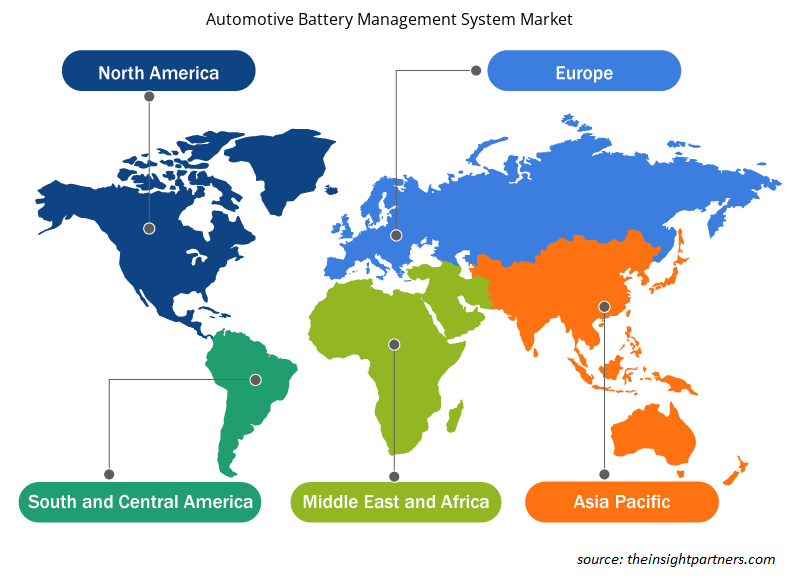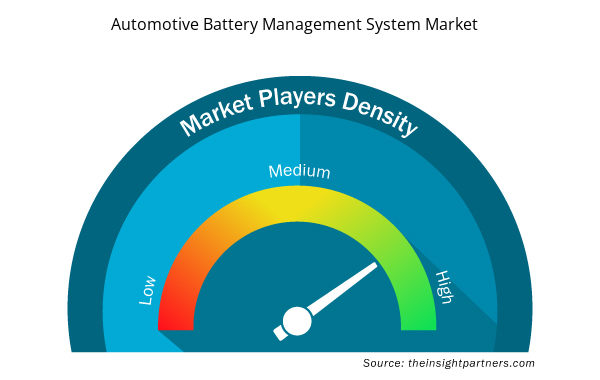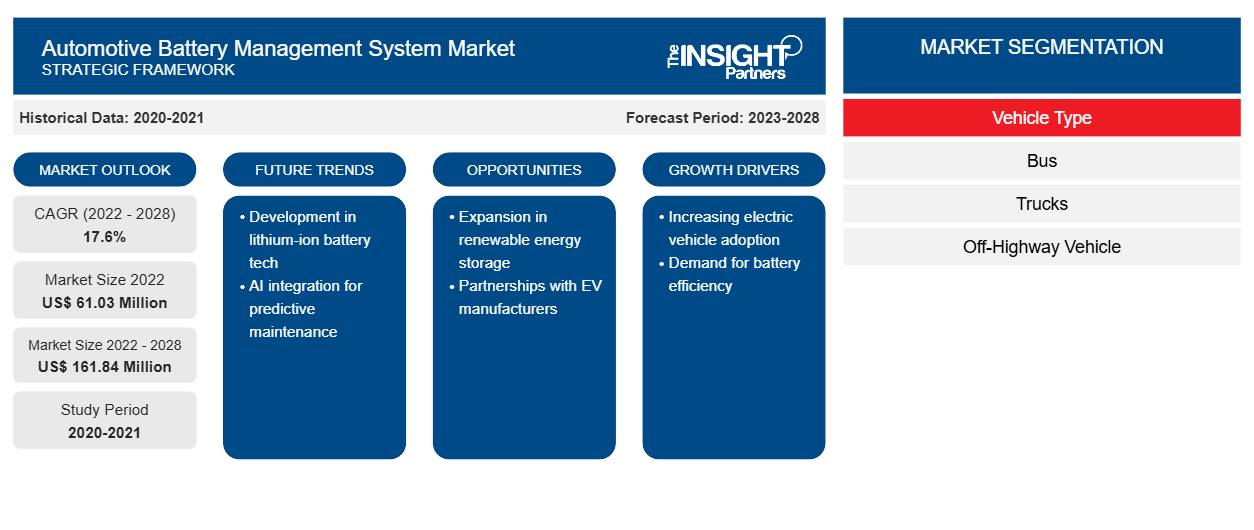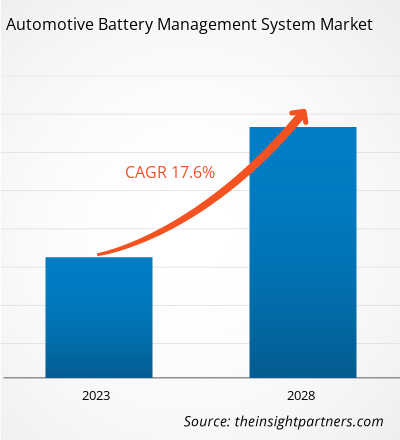من المتوقع أن ينمو سوق نظام إدارة بطاريات السيارات من 61.03 مليون دولار أمريكي في عام 2022؛ ومن المتوقع أن ينمو بمعدل نمو سنوي مركب قدره 17.6٪ من عام 2022 إلى عام 2028.
يدير نظام إدارة البطارية البطاريات المستخدمة في المركبات الهجينة والكهربائية عالية الجهد. يدمج مصنعو المركبات الكهربائية ومصنعو حزم البطاريات نظام إدارة البطارية في بطاريات ليثيوم أيون لحماية حزمة البطارية. يتكون نظام البطارية الإجمالي في السيارة الكهربائية من مزيج من مكونات متعددة مثل وحدات البطارية وأجهزة الاستشعار وأجهزة التحكم وأنظمة الإدارة الحرارية وأنظمة إدارة البطاريات. مع تزايد المخاوف بشأن حماية البيئة والمبادرات الإيجابية التي اتخذتها الحكومات للحد من الانبعاثات، من المتوقع أن ينمو الطلب على المركبات الكهربائية والهجينة بوتيرة مثيرة للإعجاب خلال الفترة المتوقعة من 2022 إلى 2028. وهذا بدوره سيغذي نمو سوق نظام إدارة بطاريات السيارات .
تتميز صناعة المركبات الكهربائية وحزم البطاريات العالمية بوجود عدد قليل جدًا من الشركات المعروفة والقوية ماليًا مثل ميتسوبيشي ونيسان وتيسلا. ونتيجة لهذا، فإن القوة التفاوضية للمشترين في حجم سوق نظام إدارة بطاريات السيارات عالية جدًا. ونظرًا للبحث والتطوير المستمر في المركبات الكهربائية إلى جانب النمو السريع لسوق نظام إدارة بطاريات السيارات، فمن المتوقع أن تظل القوة التفاوضية للمشترين عالية خلال الفترة 2019-2027. تستخدم الشركات الكبرى في حجم سوق نظام إدارة بطاريات السيارات استراتيجيات مختلفة أثناء التخطيط لأنظمة البطاريات لمركباتها. ومن المتوقع أن يضغط التقدم المستمر في قطاع التكنولوجيا على مزودي نظام إدارة البطاريات للتكيف مع التغييرات للحفاظ على مكانتهم في السوق. ونظرًا لهذه الحقيقة، يميل المشترون أيضًا إلى تبديل مزودي أنظمة إدارة البطاريات على مدار فترة زمنية اعتمادًا على متطلباتهم المحددة ومحفظة التكنولوجيا لمقدمي أنظمة إدارة البطاريات.
قم بتخصيص هذا التقرير ليناسب متطلباتك
ستحصل على تخصيص لأي تقرير - مجانًا - بما في ذلك أجزاء من هذا التقرير، أو تحليل على مستوى الدولة، وحزمة بيانات Excel، بالإضافة إلى الاستفادة من العروض والخصومات الرائعة للشركات الناشئة والجامعات
- احصل على أهم اتجاهات السوق الرئيسية لهذا التقرير.ستتضمن هذه العينة المجانية تحليلاً للبيانات، بدءًا من اتجاهات السوق وحتى التقديرات والتوقعات.
تأثير جائحة كوفيد-19 على حصة سوق نظام إدارة بطاريات السيارات
أثر تفشي فيروس كورونا المستجد بشكل كبير على الاقتصاد العالمي خلال ذروته في عام 2020، مما أعاق الأنشطة التجارية في الصناعات التحويلية. قبل تفشي المرض، شهدت حصة سوق نظام إدارة بطاريات السيارات نموًا كبيرًا بسبب زيادة مبيعات المركبات الكهربائية، وارتفاع الدخل المتاح، وسهولة توافر الائتمان والتمويل. علاوة على ذلك، تعمل مبادرات الاستثمار الكبيرة في تطوير المركبات الكهربائية على دفع الطلب على أنظمة إدارة بطاريات السيارات. وفقًا للمجلس الدولي للنقل النظيف، وصلت مبيعات المركبات الكهربائية العالمية إلى مستوى قياسي بلغ 6.9 مليون في عام 2021، بزيادة 107٪ عن عام 2020. ومع ذلك، أدى ظهور جائحة كوفيد-19 إلى إبطاء الاستثمار في المركبات الكهربائية وإنتاجها. خلال الأيام الأولى من الوباء، قيدت الأزمة بشكل كبير جميع الصفقات التجارية والتعاون والشراكات التي عطلت سوق نظام إدارة بطاريات السيارات. أعاق ظهور الوباء مبيعات المركبات في فبراير 2020؛ علاوة على ذلك، انخفضت المبيعات بنسبة 47٪ في الولايات المتحدة و80٪ في أوروبا بحلول أبريل. وبحسب تقرير صادر عن موقع Statista، انخفضت مبيعات السيارات العالمية إلى 63.8 مليون سيارة في عام 2020 وسجلت انتعاشًا بطيئًا في عام 2021 مع مبيعات بلغت 66 مليون سيارة.
نظرة عامة على السوق – سوق نظام إدارة بطاريات السيارات
زيادة مبيعات السيارات الكهربائية وتوسيع البنية التحتية للسيارات الكهربائية
تنمو مبيعات المركبات الكهربائية بوتيرة سريعة بسبب المخاوف المتزايدة بشأن حماية البيئة والسياسات الحكومية التي تفضل اعتماد المركبات منخفضة الانبعاثات وخالية الانبعاثات. تشجع الإعانات والتخفيضات الضريبية التي تقدمها الحكومات الشركات المصنعة على توسيع نطاق عملياتها. وفقًا لتوقعات المركبات الكهربائية العالمية، بلغت مبيعات السيارات الكهربائية، بما في ذلك المركبات الكهربائية بالكامل والمركبات الهجينة القابلة للشحن، 6.6 مليون وحدة في عام 2021. وفي نفس العام، ارتفعت المبيعات في الصين لتصل إلى 3.3 مليون، وهو ما يمثل حوالي نصف المبيعات العالمية. علاوة على ذلك، نمت مبيعات المركبات الكهربائية بنسبة 65٪ في أوروبا لتصل إلى 2.3 مليون وحدة، بينما تضاعفت المبيعات في الولايات المتحدة إلى 630 ألف وحدة في عام 2021. وبالتالي، فإن زيادة الاستثمارات في البنية التحتية للشحن وزيادة عدد السياسات الحكومية المواتية تدفع مقاييس تصنيع البطاريات، وبالتالي تعزيز الطلب على سوق نظام إدارة بطاريات السيارات.
رؤى تعتمد على نوع السيارة
بناءً على نوع السيارة، يتم تقسيم سوق نظام إدارة بطاريات السيارات إلى حافلات وشاحنات ومركبات خارج الطرق السريعة. في عام 2022، استحوذ قطاع الحافلات على أكبر حصة من سوق نظام إدارة بطاريات السيارات بسبب التبني المتزايد للبطاريات في الحافلات للتخفيف من انبعاثات الكربون. علاوة على ذلك، من المتوقع أن يسجل قطاع الشاحنات أعلى معدل نمو سنوي مركب خلال فترة التنبؤ. يتزايد الطلب على أنظمة إدارة البطاريات بشكل كبير من قبل مصنعي الحافلات الكهربائية بسبب المبادرات المتزايدة للأداء الأمثل للبطارية ومراقبة درجة حرارة حزمة البطارية. بالإضافة إلى ذلك، تتزايد الحاجة إلى الحافلات المدرسية الكهربائية أيضًا في بلدان مختلفة للحد من الكربنة، مما يمكّن أيضًا مصنعي الحافلات المدرسية الكهربائية من توسيع خطوط إنتاجهم. تتبنى العديد من حكومات البلدان المختلفة حافلات التكنولوجيا الخضراء، مما يغذي الطلب على الحافلات الكهربائية، وبالتالي، يعزز نمو سوق نظام إدارة بطاريات السيارات.
رؤى إقليمية حول سوق نظام إدارة بطاريات السيارات
لقد قام المحللون في Insight Partners بشرح الاتجاهات والعوامل الإقليمية المؤثرة على سوق نظام إدارة بطاريات السيارات طوال فترة التوقعات بشكل شامل. يناقش هذا القسم أيضًا قطاعات سوق نظام إدارة بطاريات السيارات والجغرافيا في جميع أنحاء أمريكا الشمالية وأوروبا ومنطقة آسيا والمحيط الهادئ والشرق الأوسط وأفريقيا وأمريكا الجنوبية والوسطى.

- احصل على البيانات الإقليمية المحددة لسوق نظام إدارة بطاريات السيارات
نطاق تقرير سوق نظام إدارة بطاريات السيارات
| سمة التقرير | تفاصيل |
|---|---|
| حجم السوق في عام 2022 | 61.03 مليون دولار أمريكي |
| حجم السوق بحلول عام 2028 | 161.84 مليون دولار أمريكي |
| معدل النمو السنوي المركب العالمي (2022 - 2028) | 17.6% |
| البيانات التاريخية | 2020-2021 |
| فترة التنبؤ | 2023-2028 |
| القطاعات المغطاة | حسب نوع السيارة
|
| المناطق والدول المغطاة | أمريكا الشمالية
|
| قادة السوق وملفات تعريف الشركات الرئيسية |
|
كثافة اللاعبين في سوق نظام إدارة بطاريات السيارات: فهم تأثيرها على ديناميكيات الأعمال
يشهد سوق أنظمة إدارة بطاريات السيارات نموًا سريعًا، مدفوعًا بالطلب المتزايد من المستخدم النهائي بسبب عوامل مثل تفضيلات المستهلكين المتطورة والتقدم التكنولوجي والوعي المتزايد بفوائد المنتج. ومع ارتفاع الطلب، تعمل الشركات على توسيع عروضها والابتكار لتلبية احتياجات المستهلكين والاستفادة من الاتجاهات الناشئة، مما يؤدي إلى زيادة نمو السوق.
تشير كثافة اللاعبين في السوق إلى توزيع الشركات أو المؤسسات العاملة في سوق أو صناعة معينة. وهي تشير إلى عدد المنافسين (اللاعبين في السوق) الموجودين في مساحة سوق معينة نسبة إلى حجمها أو قيمتها السوقية الإجمالية.
الشركات الرئيسية العاملة في سوق نظام إدارة بطارية السيارات هي:
- شركة كونتيننتال ايه جي
- شركة دانا المحدودة
- جينثيرم
- أنظمة هانون
- شركة ماهله المحدودة
إخلاء المسؤولية : الشركات المذكورة أعلاه ليست مرتبة بأي ترتيب معين.

- احصل على نظرة عامة على أهم اللاعبين الرئيسيين في سوق نظام إدارة بطاريات السيارات
يركز اللاعبون العاملون في سوق نظام إدارة بطاريات السيارات بشكل أساسي على تطوير المنتجات المتقدمة والفعالة.
- في أغسطس 2021، أعلنت شركة فارتا، الخبيرة في مجال البطاريات، وشركة كونتينتال إنجينيرنج سيرفيسز (CES)، وهي شركة تقدم خدمات التطوير والإنتاج، عن تعاونهما في تطوير حزمة بطارية قابلة للاستبدال بقوة 48 فولت للدراجات ذات العجلتين التي تعمل بالكهرباء بقوة 10 كيلو وات أو أكثر، وذلك كجزء من مشروع تجريبي أولي.
- في يونيو 2021، أعلنت شركة Carrar، وهي شركة إسرائيلية تعمل على إنشاء أنظمة إدارة حرارية متفوقة لقطاع التنقل الكهربائي، أن شركة Gentherm، الشركة الرائدة في السوق ومبتكرة حلول إدارة الحرارة المتطورة، هي المستثمر الرئيسي في جولة تمويل أولية.
تم تقسيم سوق نظام إدارة بطاريات السيارات إلى خمس مناطق رئيسية - أمريكا الشمالية وأوروبا ومنطقة آسيا والمحيط الهادئ وبقية العالم. في عام 2022، قادت منطقة آسيا والمحيط الهادئ السوق بحصة كبيرة من الإيرادات، تليها أوروبا. علاوة على ذلك، من المتوقع أن تسجل منطقة آسيا والمحيط الهادئ أعلى معدل نمو سنوي مركب في السوق من عام 2022 إلى عام 2028.
تعد شركة Continental AG؛ وDana Limited؛ وGENTHERM؛ وHanon Systems؛ وMahle GmbH؛ وNXP Semiconductors؛ وRenesas Electronics Corporation؛ وRobert Bosch GmbH؛ وValeo؛ وMarelli Holdings Co., Ltd. من بين اللاعبين الرئيسيين العاملين في سوق نظام إدارة بطاريات السيارات. يوفر تقرير السوق رؤى تفصيلية للسوق، مما يساعد اللاعبين الرئيسيين على وضع استراتيجيات للنمو في السنوات القادمة.
- التحليل التاريخي (سنتان)، السنة الأساسية، التوقعات (7 سنوات) مع معدل النمو السنوي المركب
- تحليل PEST و SWOT
- حجم السوق والقيمة / الحجم - عالميًا وإقليميًا وقطريًا
- الصناعة والمنافسة
- مجموعة بيانات Excel


- Data Center Cooling Market
- Aesthetic Medical Devices Market
- Online Recruitment Market
- Ceiling Fans Market
- Medical and Research Grade Collagen Market
- Europe Industrial Chillers Market
- Neurovascular Devices Market
- Hair Extensions Market
- Rare Neurological Disease Treatment Market
- Piling Machines Market

Report Coverage
Revenue forecast, Company Analysis, Industry landscape, Growth factors, and Trends

Segment Covered
This text is related
to segments covered.

Regional Scope
North America, Europe, Asia Pacific, Middle East & Africa, South & Central America

Country Scope
This text is related
to country scope.
الأسئلة الشائعة
Increasing Sales of EVs and Expansion of EV Infrastructure driving the need for Automotive Battery Management System market. Electric vehicle (EV) sales are growing at a fast pace owing to increasing concerns about environmental protection and government policies favoring the adoption of low-emission and zero-emission vehicles. Subsidies and tax rebates offered by governments encourage manufacturers to scale up their processes.
Wireless Automotive Battery Management System is propelling the market growth. A large amount of wiring goes into an EV to connect individual cells in a battery pack, and these wires are liable to safety failures. Wireless connectivity results in high reliability, reduced costs, and decreased weight in large multicell battery packs. Wireless connections are also allowing EV manufacturers to experiment with the placement of flexible battery modules and the installation of additional sensors in the place of wires. Wireless technologies such as Zigbee and point-to-point wireless topology are being used to enable wireless battery management systems.
Asia Pacific is the fastest growing regional market, followed by North America.
Mexico and India are expected to register high growth rates during the forecast period.
The key players, holding majority shares, in Automotive Battery Management System market includes Continental AG; Dana Limited; GENTHERM; Hanon Systems; and Mahle GmbH.
The US held the largest market share in 2022, followed by China.
The incremental growth, expected to be recorded for the Automotive Battery Management System market during the forecast period, is US$ 100.81 million.
The global Automotive Battery Management System market was estimated to be US$ 61.03 million in 2022 and is expected to grow at a CAGR of 17.6%, during the forecast period 2022 - 2028.
The List of Companies - Automotive Battery Management System Market
- CONTINENTAL AG
- DANA LIMITED
- GENTHERM
- HANON SYSTEMS
- MAHLE GMBH
- NXP SEMICONDUCTORS
- RENESAS ELECTRONICS CORPORATION
- ROBERT BOSCH GMBH
- VALEO
- MARELLI HOLDINGS CO., LTD
The Insight Partners performs research in 4 major stages: Data Collection & Secondary Research, Primary Research, Data Analysis and Data Triangulation & Final Review.
- Data Collection and Secondary Research:
As a market research and consulting firm operating from a decade, we have published and advised several client across the globe. First step for any study will start with an assessment of currently available data and insights from existing reports. Further, historical and current market information is collected from Investor Presentations, Annual Reports, SEC Filings, etc., and other information related to company’s performance and market positioning are gathered from Paid Databases (Factiva, Hoovers, and Reuters) and various other publications available in public domain.
Several associations trade associates, technical forums, institutes, societies and organization are accessed to gain technical as well as market related insights through their publications such as research papers, blogs and press releases related to the studies are referred to get cues about the market. Further, white papers, journals, magazines, and other news articles published in last 3 years are scrutinized and analyzed to understand the current market trends.
- Primary Research:
The primarily interview analysis comprise of data obtained from industry participants interview and answers to survey questions gathered by in-house primary team.
For primary research, interviews are conducted with industry experts/CEOs/Marketing Managers/VPs/Subject Matter Experts from both demand and supply side to get a 360-degree view of the market. The primary team conducts several interviews based on the complexity of the markets to understand the various market trends and dynamics which makes research more credible and precise.
A typical research interview fulfils the following functions:
- Provides first-hand information on the market size, market trends, growth trends, competitive landscape, and outlook
- Validates and strengthens in-house secondary research findings
- Develops the analysis team’s expertise and market understanding
Primary research involves email interactions and telephone interviews for each market, category, segment, and sub-segment across geographies. The participants who typically take part in such a process include, but are not limited to:
- Industry participants: VPs, business development managers, market intelligence managers and national sales managers
- Outside experts: Valuation experts, research analysts and key opinion leaders specializing in the electronics and semiconductor industry.
Below is the breakup of our primary respondents by company, designation, and region:

Once we receive the confirmation from primary research sources or primary respondents, we finalize the base year market estimation and forecast the data as per the macroeconomic and microeconomic factors assessed during data collection.
- Data Analysis:
Once data is validated through both secondary as well as primary respondents, we finalize the market estimations by hypothesis formulation and factor analysis at regional and country level.
- Macro-Economic Factor Analysis:
We analyse macroeconomic indicators such the gross domestic product (GDP), increase in the demand for goods and services across industries, technological advancement, regional economic growth, governmental policies, the influence of COVID-19, PEST analysis, and other aspects. This analysis aids in setting benchmarks for various nations/regions and approximating market splits. Additionally, the general trend of the aforementioned components aid in determining the market's development possibilities.
- Country Level Data:
Various factors that are especially aligned to the country are taken into account to determine the market size for a certain area and country, including the presence of vendors, such as headquarters and offices, the country's GDP, demand patterns, and industry growth. To comprehend the market dynamics for the nation, a number of growth variables, inhibitors, application areas, and current market trends are researched. The aforementioned elements aid in determining the country's overall market's growth potential.
- Company Profile:
The “Table of Contents” is formulated by listing and analyzing more than 25 - 30 companies operating in the market ecosystem across geographies. However, we profile only 10 companies as a standard practice in our syndicate reports. These 10 companies comprise leading, emerging, and regional players. Nonetheless, our analysis is not restricted to the 10 listed companies, we also analyze other companies present in the market to develop a holistic view and understand the prevailing trends. The “Company Profiles” section in the report covers key facts, business description, products & services, financial information, SWOT analysis, and key developments. The financial information presented is extracted from the annual reports and official documents of the publicly listed companies. Upon collecting the information for the sections of respective companies, we verify them via various primary sources and then compile the data in respective company profiles. The company level information helps us in deriving the base number as well as in forecasting the market size.
- Developing Base Number:
Aggregation of sales statistics (2020-2022) and macro-economic factor, and other secondary and primary research insights are utilized to arrive at base number and related market shares for 2022. The data gaps are identified in this step and relevant market data is analyzed, collected from paid primary interviews or databases. On finalizing the base year market size, forecasts are developed on the basis of macro-economic, industry and market growth factors and company level analysis.
- Data Triangulation and Final Review:
The market findings and base year market size calculations are validated from supply as well as demand side. Demand side validations are based on macro-economic factor analysis and benchmarks for respective regions and countries. In case of supply side validations, revenues of major companies are estimated (in case not available) based on industry benchmark, approximate number of employees, product portfolio, and primary interviews revenues are gathered. Further revenue from target product/service segment is assessed to avoid overshooting of market statistics. In case of heavy deviations between supply and demand side values, all thes steps are repeated to achieve synchronization.
We follow an iterative model, wherein we share our research findings with Subject Matter Experts (SME’s) and Key Opinion Leaders (KOLs) until consensus view of the market is not formulated – this model negates any drastic deviation in the opinions of experts. Only validated and universally acceptable research findings are quoted in our reports.
We have important check points that we use to validate our research findings – which we call – data triangulation, where we validate the information, we generate from secondary sources with primary interviews and then we re-validate with our internal data bases and Subject matter experts. This comprehensive model enables us to deliver high quality, reliable data in shortest possible time.


 احصل على عينة مجانية لهذا التقرير
احصل على عينة مجانية لهذا التقرير